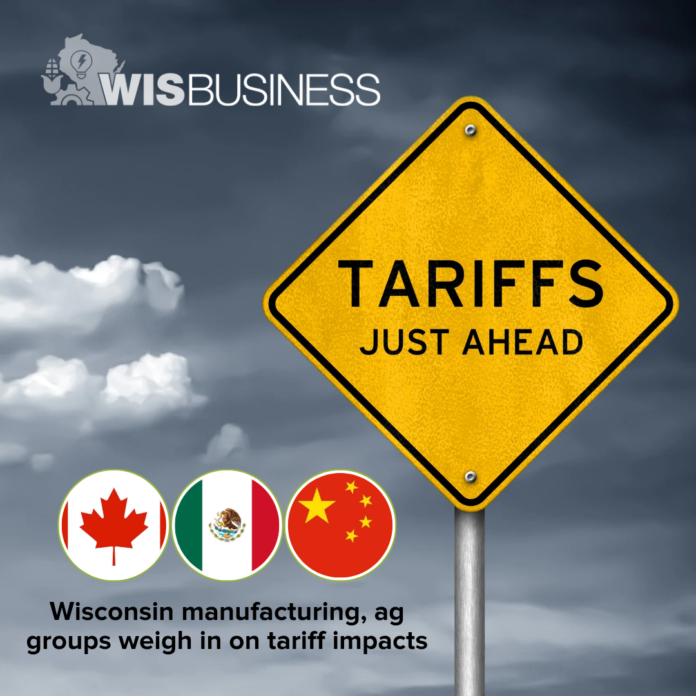Wisconsin manufacturing groups are raising concerns about tariff impacts on supply chains and the cost of energy, while soybean farmers in the state are looking for a “quick resolution” to avoid long-term damage to their trade relationships.
President Donald Trump has imposed 25% tariffs on imports from Mexico and Canada — though tariffs on Canadian energy are limited to 10% — and increased existing tariffs on Chinese goods to 20%. These actions against the United States’ largest trading partners immediately prompted threats of retaliatory tariffs.
Buckley Brinkman, executive director and CEO of the Wisconsin Center for Manufacturing & Productivity, emphasized the uncertainty these tariffs create for manufacturers in the state.
“Manufacturers thrive with certainty and being able to deal with shifts in market, not necessarily the shifts that are caused by external factors,” he said in an interview today, adding “we just figured out our supply chains from the last disruption, and now we’re going to have to figure out how we can make the adjustments that are necessary to deal with these tariffs.”
He noted this period of adjustment will be “difficult” but also said “manufacturers are a resilient bunch, and we’ll find a way to adapt and thrive.”
In a statement today, Wisconsin Manufacturers & Commerce President and CEO Kurt Bauer said the tariffs on imports from Canada and Mexico will hit companies “differently depending on what the company does and what sector of the economy” in which they operate.
He said it will take time to determine the “full effect” of the tariffs on Wisconsin and the U.S. economy, but said WMC is most concerned about the impact on supply chain and energy costs.
“For example, the supply chain will be stressed for some companies, similar to what we saw during COVID-19. And Wisconsin gets much of our oil and gas from Canada, specifically Alberta,” Bauer said. “A 10 percent tariff on imports will increase the cost, which will affect the entire economy in some way, including manufacturing, agriculture, shipping, etc.”
Buckley said any short-term impact of efforts to find new suppliers or “reshoring” production domestically will be “relatively modest,” while manufacturers will likely be passing on price increases to consumers.
“The average price of a car could go up $3,000 a vehicle,” he said. “The price of gas in the Upper Midwest, where we get that from Canada, could go up 75 cents a gallon. And so, there’s going to be some real pressures here that we’re going to have to adapt to and adjust.”
Canada, Mexico and China have each responded with plans for retaliatory tariffs, with China moving to enact tariffs of up to 15% on products imported from the U.S., including agricultural goods such as wheat, corn and soybeans.
Tanner Johnson, a board member for the Wisconsin Soybean Association and soybean farmer in Prairie Farm, represents Wisconsin on the board of the American Soybean Association. In an interview today, he noted soybeans are the No. 1 U.S. ag export to China and will face a 10% tariff.
“And of course, we’re the tip of the spear when it comes to retaliatory tariffs, so we’re obviously not a fan of it,” he said. “I’m not an alarmist. I don’t think the sky is falling. But it certainly has the potential to in ‘soyland.’ So I think we’re monitoring the situation very closely.”
He noted soybean farmers helped develop export markets in China over decades by building relationships with buyers, and “we don’t want to see our hard work thrown away over a trade spat.” He said it’s crucial to maintain the positive relationships that enable U.S. soybean exports to flourish, as Chinese markets buy one in every three rows of soybeans grown domestically.
Johnson says he’s “cautiously optimistic it will be short-term pain for long-term gain,” but notes the tariffs will cause some discomfort in Wisconsin and nationally for soybean farmers.
“I can’t predict that the strategy this administration is using is going to be detrimental, but it’s certainly lacking clarity at the moment,” he said. “Without clarity, we obviously have reason to panic, and to be concerned about any downstream effects … we’re obviously looking for quick resolution and urging this administration to negotiate a long-term deal that’s positive to this country and soybean farmers.”
Johnson is currently attending the Commodity Classic in Denver, the largest indoor agricultural trade show in the country with more than 11,000 attendees.
“To say that it’s the number one topic that’s being discussed is an understatement,” he said.
Meanwhile, a spokesperson for the Wisconsin Farm Bureau Federation says the group is hopeful Trump can “limit trade disruptions” and ensure farmers aren’t caught in the crosshairs of tariff battles. WFBF Director of National Affairs Tyler Wenzlaff notes farmers in Wisconsin have already made planting decisions for the 2025 season and commitments based on “expected market conditions” and availability of inputs.
“Uncertainty in trade policy and potential supply chain disruptions could have significant financial consequences, making it even more critical that trade agreements support stability and access to essential agricultural inputs,” Wenzlaff said in a statement.
Gov. Tony Evers at a WisPolitics luncheon said tariffs on Canada, Mexico and China will have a negative impact on Wisconsin and possibly reduce the state’s projected $4.3 billion surplus.
Evers at the Madison event criticized Congress for not taking action, saying “it’s going to be hell to pay.”
“This is not a good situation. We have good working relationships with Canada, certainly we do with Mexico also, but just knowing that they’re already retaliating against us, this is not good for our democracy,” Evers said.
Evers said “of course” the tariffs will have an impact on the state’s projected surplus. He touted measures in his budget, including $2 billion for tax cuts, which aim to help cut costs.
“Those are steps in the right direction, right? Making sure that over-the-counter things and pharmacies are sales tax-free. But will that make up for what’s going on worldwide? No, it’s not. So … it makes our jobs a lot harder,” he said.
WisGOP Rapid Response Director Anika Rickard in a statement to WisPolitics said “President Trump has a simple request for Mexico and Canada: help secure the borders and stop the flow of fentanyl.”
“Tony Evers should be working with the Administration to protect our communities instead of trying to score political points,” Rickard said.
U.S. Sen. Ron Johnson, usually a staunch Trump defender, says he’s concerned.
“I’m concerned about retaliation against Wisconsin manufacturers, against builders, against farmers. I’m concerned about the potential inflationary impact of that, although that is, there’s nothing, there’s nothing simple about that calculation,” he told the WisPolitics “Capitol Chats” podcast. “I do realize that President Trump, I think, very effectively used tariffs to, for example, secure the border with Mexico.”
He noted that when Mexico wasn’t complying with or helping the “remain in Mexico” policy, Trump threatened tariffs and got the Mexican government’s cooperation with securing the border.
Johnson, R-Oshkosh, referenced the White House pointing to the flow of fentanyl as justification for the tariffs, though he said “I’m not exactly sure” what the administration wants both Mexico and Canada to do before considering lifting the tariffs.
“First of all, it’d be good to try and reduce the flow of fentanyl, which is killing 10s of 1000s of Americans a year. So I understand the goals but put me down as concerned,” Johnson said. “I think I share what we’re seeing in the financial markets as well. They’re obviously concerned about disruption supply chains, so I’m making my concerns very well known, the administration.”
See the luncheon video at WisconsinEye.






